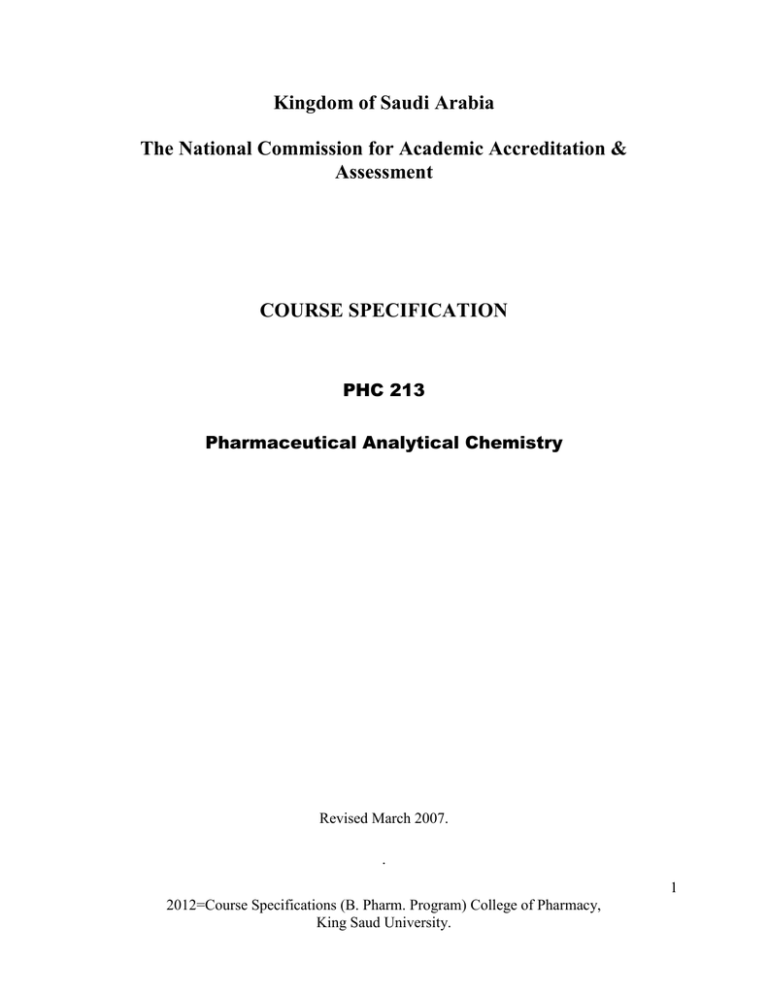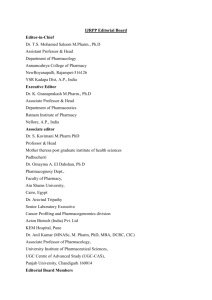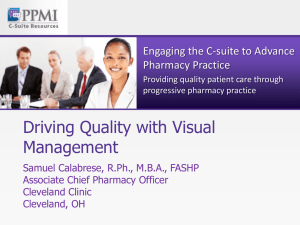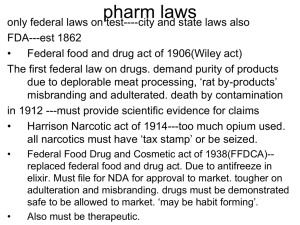2-PHC_213_Course_Specifications-M - Home
advertisement

Kingdom of Saudi Arabia The National Commission for Academic Accreditation & Assessment COURSE SPECIFICATION PHC 213 Pharmaceutical Analytical Chemistry Revised March 2007. . 1 2012=Course Specifications (B. Pharm. Program) College of Pharmacy, King Saud University. Course Specification Institution: King Saud University College/Department: Pharmacy, Pharmaceutical Chemistry A Course Identification and General Information 1. Course title and code: Pharmaceutical Analytical Chemistry PHC 213 2. Credit hours: 3 (2+1) 3. Program(s) in which the course is offered: B. Pharm. 4. Name of faculty member responsible for the course: Dr. Mohamed Abu-Nasef, Dr. Abdelrahman Almaged, Dr. Mohamed El-Hefnawy, Dr. Ibrahim Darwish, Dr. Hany Darwish (Male Section.) Dr. Nora Alzoman , Dr. Mona alshehri(Female section) 5. Level/year at which this course is offered: Level 3 6. Pre-requisites for this course (if any): 105, 106 Chem. 7. Co-requisites for this course (if any): NA 8. Location if not on main campus Malaz and Derreiyah 9.Course Language : English 2 2012=Course Specifications (B. Pharm. Program) College of Pharmacy, King Saud University. B Objectives 1. Summary of the main learning outcomes for students enrolled in the course. The course presents fundamental concepts and applications of volumetric analysis based on acid-base, precipitation, complexation and redox reaction. In addition on introduction to gravimetric analysis is given. C. Course Description (Note: General description in the form to be used for the Bulletin or Handbook should be attached) 1 Topics to be Covered List of Topics No of Weeks 2 Contact hours 4 2 4 2 4 3 6 4 8 1 Total 2 28 Acid-Base Titrations Precipitation and Complex-formation Titrations Oxidation-Reduction Titrations Ultraviolet-visible spectrophotometry Introduction to high performance liquid chromatography (HPLC) Two Examinations 2 Course components (total contact hours per semester): Lecture: 28 Tutorial: NA Laboratory: 12 Practical/Field work/Internship Other: 3. Additional private study/learning hours expected for students per week. (This should be an average :for the semester not a specific requirement in each week): NA 3 2012=Course Specifications (B. Pharm. Program) College of Pharmacy, King Saud University. Part-4. Development of Learning Outcomes in Domains of Learning For each of the domains of learning shown below indicate: A brief summary of the knowledge or skill the course is intended to develop; A description of the teaching strategies to be used in the course to develop that knowledge or skill; The methods of student assessment to be used in the course to evaluate learning outcomes in the domain concerned. LO Teaching methods. Knowledge skills The course presents fundamental concepts and applications of volumetric analysis based on acid-base, precipitation, complexation and redox reaction. In addition on introduction to gravimetric analysis is given. Cognitive skills Critical thinking (answers to instant questions). Problem solving dealing with titrations Interpersonal skills and responsibilities How to communicate with instructors and university staff. How to work independently and as a part of a team. Communication, Information Technology and Numerical Skills. Report writing, Psychomotor Skills (if applicable) ----------NA------------ Assessment Methods Lectures Exams Labs Quizzes. Assignments Assignments Homework assignments. Solving problems Home works. Short quizzes. Conducting group experiments and writing self and group reports Report writing, oral questions and discussion. NA Students will be evaluated for different assignments: Assessment of reports, oral questions, practical exams, Exams, Quizzes, Laboratory reports, Home works NA 4 2012=Course Specifications (B. Pharm. Program) College of Pharmacy, King Saud University. 5. Schedule of Assessment Tasks for Students During the Semester Course evaluation Continuous Assessment First Assessment Test Practical First Assessment Test Second Assessment Test Practical Second Assessment Test 15% 15% 15% 15% Total Final Examination Final Paper Test Total Marks 60% 40% 100% D. Student Support 1. Arrangements for availability of teaching staff for individual student consultations and academic advice. (include amount of time teaching staff are expected to be available each week) A) Faculty web-page with communication tool B) Two office hours C) Lab Assistance (Lab Supervisors) E Learning Resources 1. Required Text(s): NA 2. Essential References ANALYTICAL CHEMISTRY, CARY CHRISTIAN, JOHN WILEY & SONS, INC., NEW YORK, USA. 4-.Electronic Materials, Web Sites etc: NA 5- Other learning material such as computer-based programs/CD, professional standards/regulations: NA F. Facilities Required Indicate requirements for the course including size of classrooms and laboratories (ie number of seats in classrooms and laboratories, extent of computer access etc.) 1. Accommodation (Lecture rooms, laboratories, etc.) 5 2012=Course Specifications (B. Pharm. Program) College of Pharmacy, King Saud University. A) Lecture rooms B) Laboratories 2. Computing resources: NA 3. Other resources : NA G Course Evaluation and Improvement Processes 1 Strategies for Obtaining Student Feedback on Effectiveness of Teaching A) Students evaluation in each semester B) Meeting with students C) Suggestions D) Open door policy E) 2 Other Strategies for Evaluation of Teaching by the Instructor or by the Department A) Self evaluation B) Peer review C) Annual outside review D) Conducting research 3 Processes for Improvement of Teaching A) Studying reports B) Training of faculty C) Exchanging faculty between different institutions 4. Processes for Verifying Standards of Student Achievement (eg. check marking by an independent member teaching staff of a sample of student work, periodic exchange and remarking of tests or a sample of assignments with staff at another institution) A) Taking a sample of assignments and exams to determine validity and reliability 5 Describe the planning arrangements for periodically reviewing course effectiveness and planning for improvement. A) Collecting all reports and evaluations at the end of the year for a reviewing purpose B) Conducting a workshop to present finding of reports and evaluation to share knowledge C) Reviewing results of reports and evaluations with outside reviewers 6 2012=Course Specifications (B. Pharm. Program) College of Pharmacy, King Saud University.



